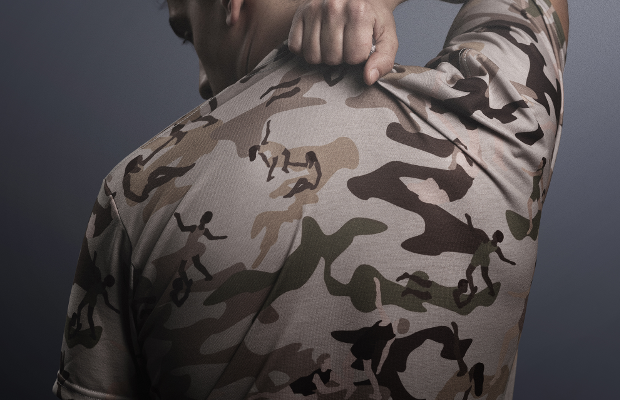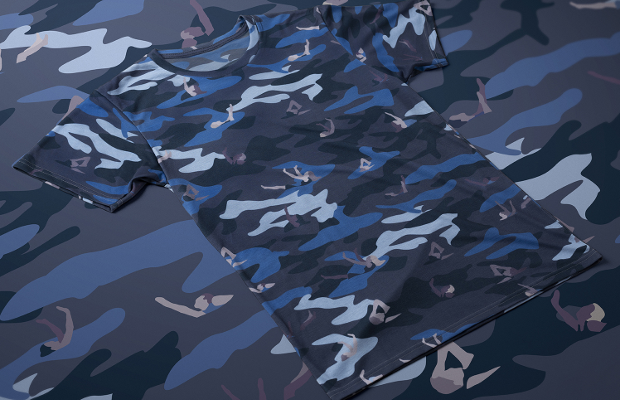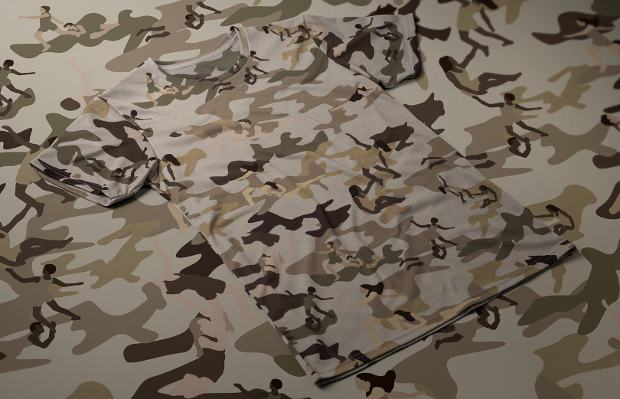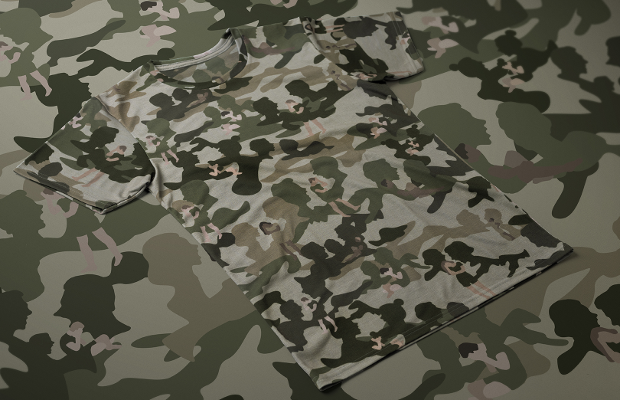
Why TAXI Hid Mental Health Issues in a Line of Camouflage Clothing

The Canadian Mental Health Association (CMHA) and TAXI Toronto last week launched 'Mental Fatigues', a striking mental health campaign that consisted of three camouflage T-shirts, each symbolically hiding a different key issue in Canadian mental health: anxiety disorder, substance use disorder, or workplace mental health. The campaign was inspired by research that showed a tendency for Canadians to hide their mental issues. That tendency is likely a worldwide issue.
The apparel line was designed in partnership with Toronto-based artist Ka Young Lee. All proceeds will go to the CMHA, Canada’s most established and extensive community mental health organization, where it will help fund advocacy, programs, and resources that enable all Canadians to flourish and thrive. While financial support is important, it only represents a portion of what this campaign hopes to accomplish. For TAXI, sparking conversation is imperative.
LBB's Addison Capper spoke with Lorne Heller, an associate creative director at TAXI Toronto, to find out more.

LBB> How did this project initially come about? Was it an idea you had that you went to CMHA with or was there a relationship prior to that?
Lorne> Mental health is a subject we’re very passionate about. It’s something we all have, and to some degree we’re all impacted by the stigma that surrounds it. Creatively, we’ve always been particularly drawn to this tendency that human beings have to hide how we feel. So, we more or less locked ourselves in a room and refused to come out until we had an idea that we thought articulated that issue in an authentic and truthful way.
Once we landed on Mental Fatigues, it was clear that CMHA would be the perfect partner to help bring it to life. Their wealth of knowledge around the mental health landscape was a huge help throughout the creative process.
LBB> What was the inspiration behind launching a clothing range? And why specifically a series of camouflage pieces?
Lorne> The idea began with the pattern. The inspiration to use camouflage came from the fashion world, where it’s having a bit of a moment. To us, that cultural relevance, paired with the fact that camouflage is, traditionally, a tool for concealing things, felt like an effective way to get people talking about mental health.
Because ultimately that is our goal with this campaign – to get people talking. That’s also why we decided to apply the patterns to an apparel line. Fashion is a form of expression that people are always eager to talk about. Our thinking was that by merging this cause with an apparel line, we’d be making it a little easier for people to join the conversation around mental health.
LBB> What kind of research and insight informed this project? What were the most surprising things that you discovered?
Lorne> A lot of insights came from our collaboration with CMHA. Mental health is a sensitive subject and we wanted to make sure that we were being as conscientious and respectful as possible in our creative interpretation of this issue.
That said, our main takeaway from those conversations was that the narrative around mental health is changing. While one in five Canadians do suffer from mental illness, five in five Canadians have mental health, and it’s important that we foster an environment where each and every one of them is comfortable talking about how they feel.
LBB> Why did you work with Ka Young Lee on this project? What was it about them that made them the right fit for the campaign?
Lorne> We had a very particular vision for the illustration element of this campaign. We spent a lot of time searching for the right artist. We landed on Ka Young Lee for a couple reasons. First, she’s an incredible talent. Her subdued use of shape, colour, and tone felt spot on for the subject matter. Second, she’s local. She recently graduated from art school here in Toronto, and we’re always eager to support young local talent. She was enthusiastic and collaborative from the outset. Both Ka Young and TAXI are super pleased with the end result.

LBB> I'm intrigued specifically about the shirt that is aimed at workplace mental health issues. What informed that? Why was it important for you to highlight that?
Lorne> Working in this industry, I think we all have a special relationship with workplace stress. The long hours. The deadlines. It adds up. I think that a lot of us in advertising tend to feel like we’re just trying to keep our heads above water. But it’s not just this industry. It’s an issue that impacts half a million Canadians every week. We were blown away by that number and felt it needed to be talked about.
LBB> What are your main aims and ambitions with this project?
Lorne> Our priority with this campaign has always been to encourage an open dialogue around mental health. Raising funds is great, but ultimately, if Mental Fatigues can encourage or facilitate even a handful of constructive conversations, it’s done what we intended for it to do.
LBB> It's a very emotive subject matter - how have you personally found the experience of working on this campaign?
Lorne> Doing purpose driven work feels good. But I’d be lying if I said this campaign could single-handedly fight the stigma surrounding mental health. So, while there’s satisfaction in doing this kind of work, I think more than anything, this campaign has left us with a sense of enthusiasm to do more. There’s work to do yet.
LBB> What reaction have you seen since launch?
Lorne> The campaign has been well received. We’ve had people reach out from around the world showing their support, sharing the work, buying shirts, and – most importantly - joining the conversation.

LBB> What were the trickiest components and how did you overcome them?
Lorne> We put a lot of effort into making sure the illustrations reflected mental health issues in a tasteful, but accurate way. We looked to our partners at CMHA to help guide that process. They did a great job in helping us navigate imagery and language.
LBB> Any parting thoughts?
Lorne> Talk about your feelings. It feels good.













